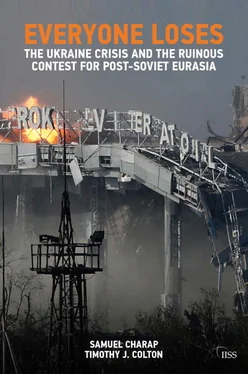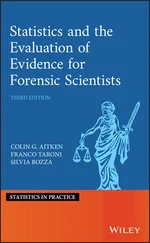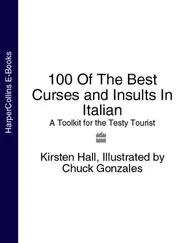Since such politically risky market reforms were not Yanukovych’s cup of tea, Moscow had leverage over the new president and was prepared to use it. Just weeks after the Black Sea Fleet deal, the Kremlin was said to have put on the table a proposal for Gazprom to acquire Naftohaz, Ukraine’s state-owned gas monopoly, in return for another discount. [2] Natal’ya Grib and Oleg Gavrish, ‘Ravnotrubie’, Kommersant Ukraina , 14 May 2010, http://www.kommersant.ru/doc/1368732 .
Naftohaz is a cash cow for plugging holes in the government budget and lining the pockets of insiders. It has also been the tie that binds the EU to Ukraine, since it manages the transit of Russian gas heading across Ukraine to Europe. Yanukovych was not about to give that away. He did, though, sign early cooperation agreements with Moscow in the steel, chemical, shipbuilding, aviation and nuclear-power sectors. The Russians were pushing him very hard; Medvedev met him seven times in the first 100 days of his term. After the seventh meeting, an exhausted Yanukovych said, ‘we can’t go on like this’. Medvedev shot back, ‘maybe we can’t, but we must’. [3] Vera Sitnina, ‘Tak rabotat’ nel’zya, no pridetsya’, Vremya novostei , 18 May 2010, http://www.vremya.ru/2010/83/4/253821.html .
Most significant geo-economically, Moscow importuned Ukraine under its new leadership to become a member of the nascent Customs Union. Then-prime minister Putin did not mince words on this score during his first meeting with Yanukovych, issuing a public entreaty for Ukraine to ‘join the Customs Union’. [4] ‘Predsedatel’ Pravitel’stva Rossiiskoi Federatsii V.V.Putin vstretilsya s Prezidentom Ukrainy V.F.Yanukovichem’, 5 March 2010, http://archive.government.ru/docs/9632/ .
The Russian demand significantly upped the ante, as the Customs Union was much more far-reaching and binding than any of the previous Russia-led regional endeavours, most recently the SES. Partly this was about timing: the Customs Union got up and running the month of Yanukovych’s election. But Russia’s impatience seemed to be driven more by the growing geo-economic contest with the EU in the region. The Eastern Partnership had just been unveiled, and Ukraine had by now negotiated much of the text for an AA and the DCFTA within it. Locking in Ukraine’s Customs Union membership would have boosted Russia’s pet project and blocked Ukraine from proceeding with the EU deal. Moscow was not interested in allowing the Ukrainians to have their cake and eat it. The Kremlin meant to thwart the EU’s geo-economic expansion by expanding its own geo-economic sphere. Hence the Customs Union offer was presented as a binary choice – in or out – unlike prior initiatives that gave Ukraine a menu of options.
When Yanukovych rejected the offer, Moscow put forth tantalising carrots – a further discount on gas prices, and tariff benefits for key industries – at a time when the Ukrainian economy was still reeling from the 2008 economic crisis and the gas-price hike stemming from the 2009 contract. [5] See ‘Rossiya rasschityvaet, chto Ukraina k 2015 godu voidet v Tamozhennyi soyuz’, RIA Novosti , 9 December 2012, http://ria.ru/economy/20121209/914040052.html ; Rilka Dragneva and Kataryna Wolczuk, Ukraine Between the EU and Russia (London: Palgrave Macmillan, 2015), p. 68.
Russian officials also frequently cited studies showing major economic benefits for Ukraine from Customs Union membership, and made claims that the DCFTA would cause it grievous economic harm. [6] See, for example, Evraziiskii Bank Razvitiya, ‘Ukraina i Tamozhennyi soyuz’, 2012, http://www.eabr.org/general/upload/reports/Ukraina_doklad_rus.pdf .
In April 2011, Yanukovych tried to meet Moscow halfway, proposing a ‘3+1’ formula for the relationship. [7] Valerii Kalnysh, ‘Viktor Yanukovich reshil slozhit’sya c Rossiei’, Kommersant , 8 April 2011, http://www.kommersant.ru/doc/1616528 .
Russia rejected the idea out of hand. As the head of the Customs Union Commission, Sergei Glaziev, said, ‘Outside of the Customs Union it will be impossible to make progress…. The only option for Ukraine is full participation in the work of the Customs Union. All other formulas have no basis to them.’ [8] Sergei Sidorenko, ‘Tamozhennyi soyuz — eto tol’ko pervyi etap integratsii’, Kommersant , 18 April 2011, http://www.kommersant.ru/doc/1623955 .
Kyiv was to halt its talks with Brussels in favour of immersion in Russia’s most ambitious geo-economic initiative since the collapse of the Soviet Union.
The Ukrainian leadership was unmoved. It initialled the AA in March 2012, leaving only technical and legal formalities before the signing ceremony. But on a political level, Ukraine’s relationship with the EU had begun to sour. A particular irritant was the sentencing of Tymoshenko, the former prime minister and Yanukovych’s arch-foe, to a seven-year prison term, on trumped-up charges. As EU rebukes for this blatant abuse of power grew vociferous, Ukraine seemed to waver in its preference for the AA over Customs Union membership. ‘Today’, the Ukrainian ambassador to Moscow said in November 2012, ‘we don’t say either yes or no [to Customs Union membership]’. But, he added, if Ukraine’s trade with the bloc grows, and the EU’s economic woes deepen, ‘the answer will more likely be yes than no’. [9] ‘Posol Ukrainy v RF nazval usloviya vstupleniya v Tamozhennyi soyuz’, Zerkalo nedeli , 13 November 2012, http://zn.ua/ECONOMICS/posol_ukrainy_v_rf_nazval_usloviya_vstupleniya_v_tamozhennyy_soyuz.html .
Yanukovych’s government was divided on the issue. The president seemed to be mindful that the treatment of Tymoshenko had become a litmus test for the EU, and wanted to buttress his bargaining position with Brussels by demonstrating that he had other options, in keeping with the Ukrainian tradition of playing one party off the other. Some lesser officials, often those linked to industries that exported mostly to the EU, ruled out Customs Union membership, while others suggested it could be possible in the future. [10] After a deputy prime minister declared that Customs Union membership contravened Ukrainian law, then-prime minister Mykola Azarov publicly contradicted him during a visit to Moscow. See ‘Azarov zaveril Rossiyu, chto ne schitaet chlenstvo Ukrainy v Tamozhennom soyuze nezakonnym’, Zerkalo nedeli , 21 November 2012, http://zn.ua/ECONOMICS/azarov_zaveril_rossiyu,_chto_ne_schitaet_chlenstvo_ukrainy_v_tamozhennom_soyuze_nezakonnym.html .
Ukraine’s economic circumstances were on a downward slide, and Yanukovych and his ministers still coveted an extra gas discount from Russia to relieve the pain.
More important than these tactical considerations, Yanukovych’s waffling reflected the bedrock economic realities of his country. Ukraine’s trade was divided almost evenly between the EU and Russia. So Yanukovych’s attempt to avoid a binary choice between them was understandable, even if other motives were also in play. Unfortunately, neither the EU nor Russia offered him a way to do so. Speaking for the EU in December 2012, one official pronounced it ‘impossible for Ukraine to align with both [the EU and the Customs Union] at the same time. Ukraine should choose which path to take…. Even partial accession to the Customs Union… would be problematic.’ [11] ‘V Evrosoyuze zayavili, chto lyuboe uchastie Ukrainy v Tamozhennom soyuze nesovmestimo s dal’neishei evrointegratsiei’, Zerkalo nedeli , 25 December 2012, http://zn.ua/POLITICS/evrosoyuze_zayavili,_chto_lyuboe_uchastie_ukrainy_v_tamozhennom_soyuze_nesovmestimo_s_dalneyshey_evr.html .
The next month, a senior Russian diplomat used more colourful language to make the same point from Moscow’s angle: ‘Ukraine wants to simultaneously maintain two vectors: both to join the EU [sic]… and to participate in the Customs Union, but only in those areas where it stands to gain. But things don’t work that way. You cannot be a little bit pregnant.’ [12] ‘Vmesto pozdravleniya: Rossiya pred’yavila Ukraine tamozhenno-gazovyi ul’timatum’, NEWSru.com , 2 January 2013, http://www.newsru.com/finance/02jan2013/rus_ukr.html .
A geo-economic confrontation was in the offing. Both the EU and Russia were less interested in preventing it than in prevailing in it.
Читать дальше











